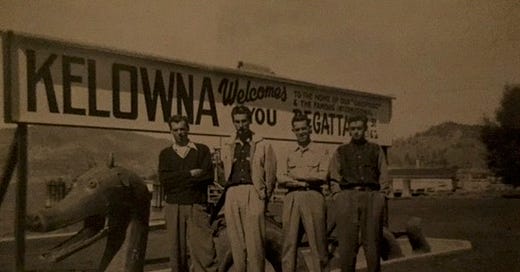photo of my dad, with friends and the Ogopogo of the Okanagan, BC
~~~
Dialogue punctuation is an oddly tricky part of writing fiction. You can learn by studying the dialogue in the novels you read. But review this, then study. Then apply to your own work.
A straightforward primer
Stand-alone dialogue:
“I don’t care.”
The period is inside the double quotation marks. Punctuation — periods, commas, exclamation and question marks — go inside.
Dialogue with a speech tag
“I don’t care,” said Sally.
The speech tag is a part of the sentence, so a comma is used (within the quotation marks), and the period moved to the end.
Dialogue divided by speech tag
“I don’t care,” said Sally, “about your old punctuation stuff.”
The two bits of dialogue are parts of the same sentence, so the speech tag is set apart by two commas. (If in doubt, read aloud just the dialogue, omitting the tag, and “hear” the sentence.)
Two separate bits of dialogue with speech tag
“I don’t care,” said Sally. “Your dialogue issues are your problem.”
Here, you have two complete sentences. So the period ends the first (after the speech tag) and you must begin the second as you would any sentence, with a capital. This could also read: “I don’t care.” Sally said, “Your dialogue issues are your problem.” It would not be incorrect, but read aloud sounds strange. Rhythm is missing.
Two bits of dialogue with an action in between
“I don’t care.” Sally yawned. “I’m going to go to sleep.”
Here, the “tag” is not a speech tag. It isn’t “said,” or “whispered,” or “grumbled.” A yawn is a physical action. Often there’s confusion about words like “snort” or “laugh,” possibly because these actions involve the mouth. Can you actually speak while doing these things? (Try it.) An action is set apart as its own sentence, with a period, not a comma. (Another action oddity is “hiss,” as in “Sally hissed.” You can’t “hiss” words that don’t have an s-sound.)
Action tags
An “action tag” — a stand-in for a speech tag — can be good rhythmic way to break up a series of speech tags. It is included in the same paragraph with the dialogue, so the reader will understand who is speaking, and in a brief bite, can build a bit of characterization or story or something beyond the monotonous “said.”
Kezia scratched the balding spot behind her ear. “I don’t want anything to do with punctuation!”
Exclamation and question marks can pretend they’re commas and periods
“I don’t care!” said Sally. “Should I?”
Note that the “said” has a lower case s and the exclamation is acting as a comma (an Oscar performance), and the speech tag is all still part of the same sentence. Sometimes, writers think they need to do this: “I don’t care!”, said Sally. But no, you don’t. Let the exclamation (or stand-in) do its job.
Doesn’t draw attention
Next time you encounter a passage of dialogue in a book that just flows with rhythm and allows you to hear the characters, dissect it to see how the punctuation is working to create that flow. When it’s working, you take no notice of it. Which is why I felt compelled to write this piece!
Happy punctuating. Or !





Hi Alison
I feel like you wrote this one just for me ha ha. So thank you. On a related topic is the subject of punctuation for the thoughts that go through the character’s head. Sometimes it feels like there should be quotations even though there isn’t - Ie Having to deal with punctuation is annoying , Sally thought.
I’ve been reading many Spanish authors lately, and I noticed they start dialogue with em dashes. I couldn’t find any information online about what this style is called or if it’s particular to Spanish writing. Do you have any insight into this?
I’ll translate an example from a page I was reading this morning.
— As always —continued Mariajo—. We will lose track of you in some third world country, although the real owner may live here, two blocks from this building.
—Isn’t it strange they both belong to the same company? Maybe we can’t know its owner, but we can find more out more properties that belong to them, and we can image that they aren’t used for anything good —suggested Orduño.
—It’s a good ides, let’s go look —accepted Mariajo.